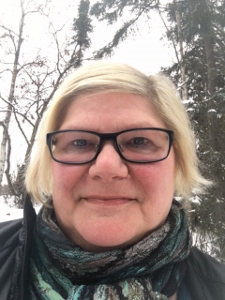As a practicing social worker in Anchorage for over twenty-five years, Kathi Trawver regards community partnerships as “a bit of a no-brainer.” For starters, field work in the surrounding community serves an integral and practical function of her discipline. However, she also acknowledges that addressing some of Anchorage’s most pressing issues helps her attend to a more critical, pressing lifelong question: “So what?”
Dr. Trawver thinks that we
each possess a “So what?” question, even if we never actively phrase it as
such. Think of it as an inner-prompt that helps us identify why we think we’re here in
the world – a reflective inquiry that helps us better understand why we do what
we do. That “So What” leads you to pursue the work you find important and
necessary. “For example,” she shares, “for me, staying connected
to the community and engaged in it as a practitioner has always answered that
‘so what’ question for me.”
From early into her practice, she felt
most at home helping practitioners lead clients to the necessary information,
services, and resources that best afforded them a means to achieve their goals.
She admits that working at this level has always felt like a natural impulse
for her.
“No one should ever have to knock on
twenty wrong doors to meet a critical need,” she argues, “In our work, we’re
supposed to take away all wrong doors and to fill in the gaps where we find
system fragmentation. So, a big part of my focus has been trying to address the
fragmented system where people often have trouble connecting or talking with
each other.”
Shortly into her work in the mental health
field, Kathi noticed that many of her clients – adults struggling with serious
mental illness – were often released from services and returning to their
communities either homeless, precariously housed, or headed to jail. It wasn’t
long before she noticed a trend.
“Among those suffering from mental
illness, you’re often in one of three places at all times: an institution like
API, in prison, or out on the streets.”
This realization, nearly thirteen years
ago, led Dr. Trawver to focus her energies on the many issues relating to
homelessness and housing insecurity in Anchorage. This, in turn, soon led to
her involvement with the CCEL.
“My first UAA
community-engaged project was working with Anchorage Project Homeless Connect(APHC),” she recalls, “I planned a variety of events with them – some of which
involved social work students as volunteers assisting in the evaluation of the
project.”
One of these was APHC’s “One Stop Shop.”
“We started up the One Stop Shop with APHC
as a one day event where as many of our providers as possible could set up shop
at one location and people experiencing homelessness could come and get
whatever they most needed at that time.”
 |
| Community Volunteers for Anchorage Project Homeless Connect |
More recently, through
the CCEL, she partnered with Dr. Donna Aguiniga, two CESAs, and almost 50 UAA
students to conduct a two-year project with community homeless social service
providers to conduct an assertive unsheltered and homeless youth point-in-time
count.
Over the past year, she’s
also helped the State of Alaska Council on the Homeless conduct a statewide
survey of municipal governments to determine needs related to homelessness and
co-developed and presented statewide training for intake data collection for
the January 2017 Project Homeless Connect events held across the state.
In addition to the above,
she serves on the Anchorage Coalition to End Homelessness Board of
Directors, Chair their Data Committee, and sits on the Alaska Homelessness
Management and Information System Oversight Committee.
Dr. Trawver understands it’s not always
essential that faculty come into university positions with practice experience
in the community or as practitioners in the field. However, she also knows her
natural inclination has always been to discover what’s most useful for
practitioners on the ground. Knowing this has compelled her to bring her
discoveries as a practitioner to the university, while continuing to explore what’s
going to make a difference for individuals working in programs aiming to serve
others.
“Even
in my research, I’m not looking down, trying to carve conceptual frameworks or
complicated theories about service provision. I just really want to get
practitioners what they need and the information necessary to offer better
services so that clients.” Almost for clarification, she adds, “Which
is not to say there isn’t a need or place for more theoretical and less applied
research. My heart’s just always somewhere out beyond the academic silos and in
the community.”
In fact, for Trawver, community
engagement isn’t an abstract idea or a subject for study “out there” in a
remote setting somewhere beyond the university classroom and office buildings
where she’s employed. Instead, she acknowledges that by virtue of her residence
in Anchorage, “I am the community.” Rather than distance herself from the
situations or needs that require the most pressing and immediate attention in
Anchorage, she sees no other choice than to address them head on and from the
heart.
 |
| Students from the UAA Justice System participating in Anchorage Project Homeless Connect |





